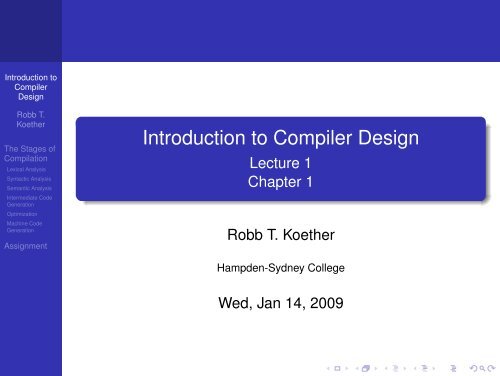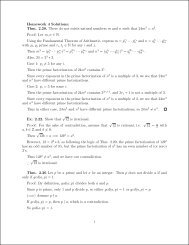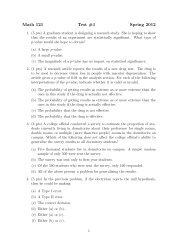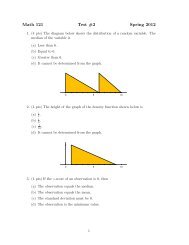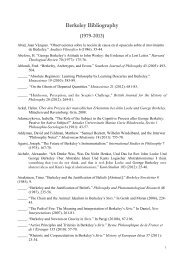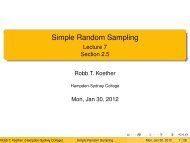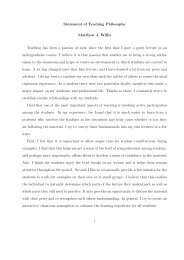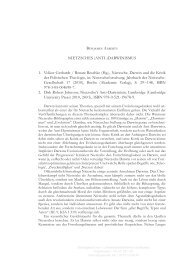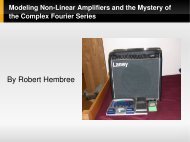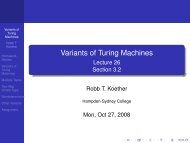Introduction to Compiler Design - Hampden-Sydney College
Introduction to Compiler Design - Hampden-Sydney College
Introduction to Compiler Design - Hampden-Sydney College
You also want an ePaper? Increase the reach of your titles
YUMPU automatically turns print PDFs into web optimized ePapers that Google loves.
<strong>Introduction</strong> <strong>to</strong><br />
<strong>Compiler</strong><br />
<strong>Design</strong><br />
Robb T.<br />
Koether<br />
The Stages of<br />
Compilation<br />
Lexical Analysis<br />
Syntactic Analysis<br />
Semantic Analysis<br />
<strong>Introduction</strong> <strong>to</strong> <strong>Compiler</strong> <strong>Design</strong><br />
Lecture 1<br />
Chapter 1<br />
Intermediate Code<br />
Generation<br />
Optimization<br />
Machine Code<br />
Generation<br />
Assignment<br />
Robb T. Koether<br />
<strong>Hampden</strong>-<strong>Sydney</strong> <strong>College</strong><br />
Wed, Jan 14, 2009
Outline<br />
<strong>Introduction</strong> <strong>to</strong><br />
<strong>Compiler</strong><br />
<strong>Design</strong><br />
Robb T.<br />
Koether<br />
The Stages of<br />
Compilation<br />
Lexical Analysis<br />
Syntactic Analysis<br />
Semantic Analysis<br />
Intermediate Code<br />
Generation<br />
Optimization<br />
Machine Code<br />
Generation<br />
Assignment<br />
1 The Stages of Compilation<br />
Lexical Analysis<br />
Syntactic Analysis<br />
Semantic Analysis<br />
Intermediate Code Generation<br />
Optimization<br />
Machine Code Generation<br />
2 Assignment
The Stages of Compilation<br />
<strong>Introduction</strong> <strong>to</strong><br />
<strong>Compiler</strong><br />
<strong>Design</strong><br />
Robb T.<br />
Koether<br />
The Stages of<br />
Compilation<br />
Lexical Analysis<br />
Syntactic Analysis<br />
Semantic Analysis<br />
Intermediate Code<br />
Generation<br />
Optimization<br />
Machine Code<br />
Generation<br />
Assignment<br />
The stages of compilation<br />
Lexical analysis<br />
Syntactic analysis.<br />
Semantic analysis.<br />
Intermediate code generation.<br />
Optimization.<br />
Machine code generation.
Lexical Analysis<br />
<strong>Introduction</strong> <strong>to</strong><br />
<strong>Compiler</strong><br />
<strong>Design</strong><br />
Robb T.<br />
Koether<br />
The Stages of<br />
Compilation<br />
Lexical Analysis<br />
Syntactic Analysis<br />
Semantic Analysis<br />
Intermediate Code<br />
Generation<br />
Optimization<br />
Machine Code<br />
Generation<br />
Definition (Token)<br />
A <strong>to</strong>ken is a smallest meaningful group symbols.<br />
Definition (Lexical analyzer)<br />
A lexical analyzer, also called a lexer or a scanner, receives<br />
a stream of characters from the source program and groups<br />
them in<strong>to</strong> <strong>to</strong>kens.<br />
Assignment<br />
Source<br />
Program<br />
Lexical<br />
Analyzer<br />
Stream<br />
of<br />
Tokens
Tokens<br />
<strong>Introduction</strong> <strong>to</strong><br />
<strong>Compiler</strong><br />
<strong>Design</strong><br />
Robb T.<br />
Koether<br />
The Stages of<br />
Compilation<br />
Lexical Analysis<br />
Syntactic Analysis<br />
Semantic Analysis<br />
Intermediate Code<br />
Generation<br />
Optimization<br />
Machine Code<br />
Generation<br />
Assignment<br />
Each <strong>to</strong>ken has a type and a value.<br />
For example,<br />
The variable count has type id and value “count”.<br />
The number 123 has type num and value “123”.<br />
The keyword int has type int and value “int”.
Example<br />
<strong>Introduction</strong> <strong>to</strong><br />
<strong>Compiler</strong><br />
<strong>Design</strong><br />
Robb T.<br />
Koether<br />
The Stages of<br />
Compilation<br />
Lexical Analysis<br />
Example (Lexical Analysis)<br />
What are the <strong>to</strong>kens in the following program?<br />
Syntactic Analysis<br />
Semantic Analysis<br />
Intermediate Code<br />
Generation<br />
Optimization<br />
Machine Code<br />
Generation<br />
Assignment<br />
int main()<br />
{<br />
int a = 123;<br />
return 0;<br />
}
Example<br />
<strong>Introduction</strong> <strong>to</strong><br />
<strong>Compiler</strong><br />
<strong>Design</strong><br />
Robb T.<br />
Koether<br />
The Stages of<br />
Compilation<br />
Lexical Analysis<br />
Syntactic Analysis<br />
Semantic Analysis<br />
Intermediate Code<br />
Generation<br />
Example (Lexical Analysis)<br />
The statement<br />
position = initial + rate * 60;<br />
would be viewed as<br />
Optimization<br />
Machine Code<br />
Generation<br />
Assignment<br />
or<br />
id 1 = id 2 + id 3 ∗ num ;<br />
id 1 assign id 2 plus id 3 times num semi<br />
by the lexer.
Lexical Analysis Tools<br />
<strong>Introduction</strong> <strong>to</strong><br />
<strong>Compiler</strong><br />
<strong>Design</strong><br />
Robb T.<br />
Koether<br />
The Stages of<br />
Compilation<br />
Lexical Analysis<br />
Syntactic Analysis<br />
Semantic Analysis<br />
Intermediate Code<br />
Generation<br />
Optimization<br />
Machine Code<br />
Generation<br />
Assignment<br />
There are <strong>to</strong>ols available <strong>to</strong> assist in the writing of<br />
lexical analyzers.<br />
lex - produces C source code (UNIX).<br />
flex - produces C source code (gnu).<br />
JLex - produces Java source code.<br />
We will use JLex.
Syntactic Analysis<br />
<strong>Introduction</strong> <strong>to</strong><br />
<strong>Compiler</strong><br />
<strong>Design</strong><br />
Robb T.<br />
Koether<br />
The Stages of<br />
Compilation<br />
Lexical Analysis<br />
Syntactic Analysis<br />
Semantic Analysis<br />
Intermediate Code<br />
Generation<br />
Optimization<br />
Machine Code<br />
Generation<br />
Assignment<br />
Definition (Syntax analyzer)<br />
A syntax analyzer, also called a parser, receives a stream of<br />
<strong>to</strong>kens from the lexer and groups them in<strong>to</strong> phrases that<br />
match specified grammatical patterns.
Syntactic Analysis<br />
<strong>Introduction</strong> <strong>to</strong><br />
<strong>Compiler</strong><br />
<strong>Design</strong><br />
Robb T.<br />
Koether<br />
The Stages of<br />
Compilation<br />
Lexical Analysis<br />
Definition (Abstract syntax tree)<br />
The output of the parser is an abstract syntax tree<br />
representing the syntactical structure of the <strong>to</strong>kens.<br />
Syntactic Analysis<br />
Semantic Analysis<br />
Intermediate Code<br />
Generation<br />
Optimization<br />
Machine Code<br />
Generation<br />
Assignment<br />
Stream<br />
of<br />
Tokens<br />
Syntax<br />
Analyzer<br />
Abstract<br />
Syntax<br />
Tree
Grammatical Patterns<br />
<strong>Introduction</strong> <strong>to</strong><br />
<strong>Compiler</strong><br />
<strong>Design</strong><br />
Robb T.<br />
Koether<br />
The Stages of<br />
Compilation<br />
Lexical Analysis<br />
Syntactic Analysis<br />
Semantic Analysis<br />
Intermediate Code<br />
Generation<br />
Grammatical patterns are described by a context-free<br />
grammar.<br />
For example, an assignment statement may be defined<br />
as<br />
Optimization<br />
Machine Code<br />
Generation<br />
Assignment<br />
stmt → id = expr ;<br />
expr → expr + expr | expr ∗ expr | id | num
Example<br />
<strong>Introduction</strong> <strong>to</strong><br />
<strong>Compiler</strong><br />
<strong>Design</strong><br />
Robb T.<br />
Koether<br />
The Stages of<br />
Compilation<br />
Lexical Analysis<br />
Example (Syntactic Analysis)<br />
The form<br />
id 1 = id 2 + id 3 ∗ num ;<br />
Syntactic Analysis<br />
Semantic Analysis<br />
Intermediate Code<br />
Generation<br />
may be represented by the following tree.<br />
Optimization<br />
Machine Code<br />
Generation<br />
Assignment<br />
=<br />
id1<br />
+<br />
id2<br />
*<br />
id3<br />
num
Syntax Analysis Tools<br />
<strong>Introduction</strong> <strong>to</strong><br />
<strong>Compiler</strong><br />
<strong>Design</strong><br />
Robb T.<br />
Koether<br />
The Stages of<br />
Compilation<br />
Lexical Analysis<br />
Syntactic Analysis<br />
Semantic Analysis<br />
Intermediate Code<br />
Generation<br />
Optimization<br />
Machine Code<br />
Generation<br />
Assignment<br />
There are <strong>to</strong>ols available <strong>to</strong> assist in the writing of<br />
parsers.<br />
yacc - produces C source code (UNIX).<br />
bison - produces C source code (gnu).<br />
CUP - produces Java source code.<br />
We will use CUP.
Semantic Analysis<br />
<strong>Introduction</strong> <strong>to</strong><br />
<strong>Compiler</strong><br />
<strong>Design</strong><br />
Robb T.<br />
Koether<br />
The Stages of<br />
Compilation<br />
Lexical Analysis<br />
Syntactic Analysis<br />
Semantic Analysis<br />
Intermediate Code<br />
Generation<br />
Optimization<br />
Machine Code<br />
Generation<br />
Assignment<br />
Definition (Semantic analyzer)<br />
A semantic analyzer traverses the abstract syntax tree,<br />
checking that each node is appropriate for its context, i.e., it<br />
checks for semantic errors. It outputs a refined abstract<br />
syntax tree.
Example: Semantic Analysis<br />
<strong>Introduction</strong> <strong>to</strong><br />
<strong>Compiler</strong><br />
<strong>Design</strong><br />
Robb T.<br />
Koether<br />
Example (Semantic Analysis)<br />
The previous tree may be refined <strong>to</strong><br />
The Stages of<br />
Compilation<br />
Lexical Analysis<br />
Syntactic Analysis<br />
Semantic Analysis<br />
Intermediate Code<br />
Generation<br />
Optimization<br />
Machine Code<br />
Generation<br />
Assignment<br />
id1<br />
=<br />
id2<br />
+<br />
*<br />
id3<br />
int<strong>to</strong>real<br />
num
Intermediate Code Generation<br />
<strong>Introduction</strong> <strong>to</strong><br />
<strong>Compiler</strong><br />
<strong>Design</strong><br />
Robb T.<br />
Koether<br />
The Stages of<br />
Compilation<br />
Lexical Analysis<br />
Syntactic Analysis<br />
Semantic Analysis<br />
Intermediate Code<br />
Generation<br />
Optimization<br />
Machine Code<br />
Generation<br />
Definition (Intermediate code)<br />
Intermediate code is code that represents the semantics of<br />
a program, but is machine-independent.<br />
Definition (Intermediate code genera<strong>to</strong>r)<br />
An intermediate code genera<strong>to</strong>r receives the abstract<br />
syntax tree and it outputs intermediate code that<br />
semantically corresponds <strong>to</strong> the abstract syntax tree.<br />
Assignment<br />
Abstract<br />
Syntax<br />
Tree<br />
Intermediate<br />
Code<br />
Genera<strong>to</strong>r<br />
Intermediate<br />
Code
Intermediate Code<br />
<strong>Introduction</strong> <strong>to</strong><br />
<strong>Compiler</strong><br />
<strong>Design</strong><br />
Robb T.<br />
Koether<br />
The Stages of<br />
Compilation<br />
Lexical Analysis<br />
Syntactic Analysis<br />
Semantic Analysis<br />
Intermediate Code<br />
Generation<br />
Optimization<br />
Machine Code<br />
Generation<br />
Assignment<br />
This stage marks the boundary between the front end<br />
and the back end.<br />
The front end is language-specific and<br />
machine-independent.<br />
The back end is machine-specific and<br />
language-independent.
Intermediate Code<br />
<strong>Introduction</strong> <strong>to</strong><br />
<strong>Compiler</strong><br />
<strong>Design</strong><br />
Robb T.<br />
Koether<br />
The Stages of<br />
Compilation<br />
Lexical Analysis<br />
Syntactic Analysis<br />
Semantic Analysis<br />
Intermediate Code<br />
Generation<br />
Optimization<br />
Machine Code<br />
Generation<br />
Assignment<br />
C<br />
Program<br />
Java<br />
Program<br />
Pascal<br />
Program<br />
Intermediate<br />
Code<br />
x86<br />
Code<br />
MIPS32<br />
Code<br />
Front End<br />
Back End
Example<br />
<strong>Introduction</strong> <strong>to</strong><br />
<strong>Compiler</strong><br />
<strong>Design</strong><br />
Robb T.<br />
Koether<br />
The Stages of<br />
Compilation<br />
Lexical Analysis<br />
Syntactic Analysis<br />
Semantic Analysis<br />
Intermediate Code<br />
Generation<br />
Optimization<br />
Machine Code<br />
Generation<br />
Assignment<br />
Example (Intermediate Code Generation)<br />
The tree in our example may be expressed in<br />
intermediate code as<br />
temp1 = int<strong>to</strong>real(60)<br />
temp2 = id3 * temp1<br />
temp3 = id2 + temp2<br />
id1 = temp3
Code Optimizer<br />
<strong>Introduction</strong> <strong>to</strong><br />
<strong>Compiler</strong><br />
<strong>Design</strong><br />
Robb T.<br />
Koether<br />
The Stages of<br />
Compilation<br />
Lexical Analysis<br />
Syntactic Analysis<br />
Semantic Analysis<br />
Intermediate Code<br />
Generation<br />
Optimization<br />
Definition (Optimizer)<br />
An optimizer reviews the code, looking for ways <strong>to</strong> reduce<br />
the number of operations and the memory requirements.<br />
A program may be optimized for speed or for size.<br />
Typically there is a trade-off between speed and size.<br />
Machine Code<br />
Generation<br />
Assignment<br />
Intermediate<br />
Code<br />
Optimizer<br />
Intermediate<br />
Code
Example<br />
<strong>Introduction</strong> <strong>to</strong><br />
<strong>Compiler</strong><br />
<strong>Design</strong><br />
Robb T.<br />
Koether<br />
The Stages of<br />
Compilation<br />
Lexical Analysis<br />
Syntactic Analysis<br />
Semantic Analysis<br />
Intermediate Code<br />
Generation<br />
Optimization<br />
Machine Code<br />
Generation<br />
Assignment<br />
Example (Optimization)<br />
The intermediate code in this example may be<br />
optimized as<br />
temp1 = id3 * 60.0<br />
id1 = id2 + temp1
Machine Code Generation<br />
<strong>Introduction</strong> <strong>to</strong><br />
<strong>Compiler</strong><br />
<strong>Design</strong><br />
Robb T.<br />
Koether<br />
The Stages of<br />
Compilation<br />
Lexical Analysis<br />
Syntactic Analysis<br />
Semantic Analysis<br />
Intermediate Code<br />
Generation<br />
Optimization<br />
Machine Code<br />
Generation<br />
Assignment<br />
The code genera<strong>to</strong>r receives the (optimized)<br />
intermediate code.<br />
It produces either<br />
Machine code for a specific machine, or<br />
Assembly code for a specific machine and assembler.<br />
If it produces assembly code, then an assembler is<br />
used <strong>to</strong> produce the machine code.
Machine Code Generation<br />
<strong>Introduction</strong> <strong>to</strong><br />
<strong>Compiler</strong><br />
<strong>Design</strong><br />
Robb T.<br />
Koether<br />
The Stages of<br />
Compilation<br />
Lexical Analysis<br />
Syntactic Analysis<br />
Semantic Analysis<br />
Intermediate<br />
Code<br />
Code<br />
Genera<strong>to</strong>r<br />
Assembly<br />
Code<br />
Intermediate Code<br />
Generation<br />
Optimization<br />
Machine Code<br />
Generation<br />
Assignment<br />
Assembler<br />
Machine<br />
Code
Example: Machine Code Generation<br />
<strong>Introduction</strong> <strong>to</strong><br />
<strong>Compiler</strong><br />
<strong>Design</strong><br />
Robb T.<br />
Koether<br />
The Stages of<br />
Compilation<br />
Lexical Analysis<br />
Syntactic Analysis<br />
Semantic Analysis<br />
Intermediate Code<br />
Generation<br />
Optimization<br />
Machine Code<br />
Generation<br />
Assignment<br />
The intermediate code may be translated in<strong>to</strong> the<br />
assembly code<br />
movf id3,R2<br />
mulf #60.0,R2<br />
movf id2,R1<br />
addf R2,R1<br />
movf R1,id1
Assignment<br />
<strong>Introduction</strong> <strong>to</strong><br />
<strong>Compiler</strong><br />
<strong>Design</strong><br />
Robb T.<br />
Koether<br />
The Stages of<br />
Compilation<br />
Lexical Analysis<br />
Syntactic Analysis<br />
Semantic Analysis<br />
Intermediate Code<br />
Generation<br />
Optimization<br />
Machine Code<br />
Generation<br />
Assignment<br />
Homework<br />
Read Chapter 1.<br />
Install Cygwin on the lab machine of your choice.<br />
Arrange with me <strong>to</strong> turn off Deep Freeze.


